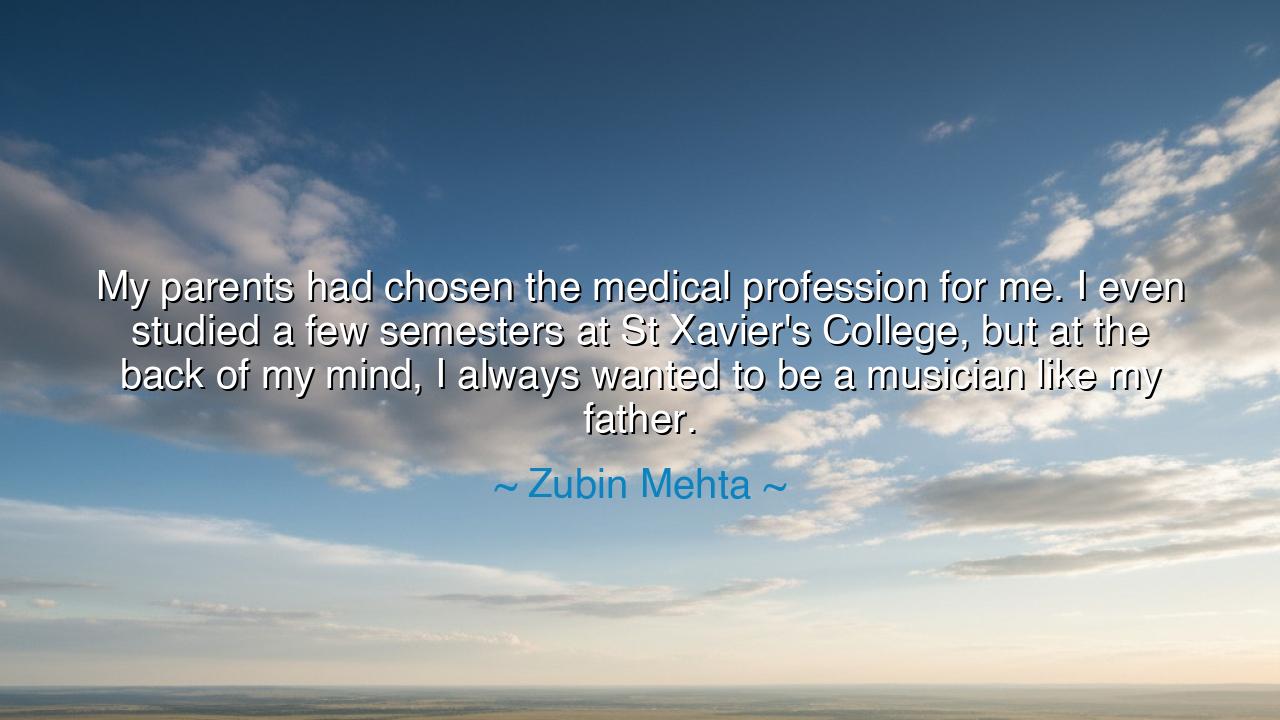
My parents had chosen the medical profession for me. I even
My parents had chosen the medical profession for me. I even studied a few semesters at St Xavier's College, but at the back of my mind, I always wanted to be a musician like my father.






The words of Zubin Mehta—“My parents had chosen the medical profession for me. I even studied a few semesters at St Xavier's College, but at the back of my mind, I always wanted to be a musician like my father”—are not merely a reflection on career choice, but a testament to the eternal struggle between duty and destiny, between the expectations of others and the whisper of one’s true calling. Within these words lies the ancient song of the human spirit, that longing to live not the life prescribed by others, but the one written in the secret chambers of the soul.
From the dawn of civilization, the elders have guided the young toward paths of safety and honor. To be a healer, a scholar, a builder—these were noble ways to live. And yet, there has always been among humanity a restless few who hear another rhythm, a melody not of logic but of passion, calling them away from comfort toward creation. Zubin Mehta, destined by his family for medicine, felt within him the pulse of music, the same heartbeat that guided his father before him. Though he walked the halls of academia, his spirit lingered in the concert halls of memory. Such is the way of destiny—it is patient, but it does not fade.
The ancient Greeks spoke of daimon, the divine spirit within every person that urges them toward their true purpose. To ignore it is to wither slowly; to honor it is to awaken one’s genius. When Mehta chose the baton over the stethoscope, he was not rebelling against his parents—he was obeying his inner daimon. He understood, perhaps unconsciously, that though medicine heals the body, music heals the soul, and his hands were meant to conduct symphonies, not surgeries. In this, he joined the lineage of those who dared to follow the voice within, even when it spoke against the voices around them.
History offers many such examples of those who left the paths chosen for them to find the one destined for them. Consider Siddhartha, the prince who abandoned his father’s palace to seek enlightenment beneath the Bodhi tree. Or Vincent van Gogh, the pastor’s son who turned away from the pulpit to paint light itself. These souls, like Mehta, knew that true fulfillment comes not from obedience to tradition, but from fidelity to one’s own truth. To deny one’s calling is to live half a life; to embrace it, even in hardship, is to touch eternity.
Zubin Mehta’s journey also reveals something gentle yet profound: the influence of inheritance. His father’s music lived in his blood, and no worldly ambition could silence it. The ancients would have called this the law of lineage—the passing down not only of names and duties, but of sacred talents. Just as the river finds its ancestral path back to the sea, so too does the child often find his way back to the art, the craft, or the dream that gave life to his forebears. When Mehta took up the baton, he was not defying his parents; he was fulfilling a deeper family legacy—the one written not in words, but in spirit.
There is a quiet sorrow in living the life others plan for you. One may achieve success, even admiration, but there remains an emptiness—a sense of having lived as an echo rather than a voice. Yet, to step away from expectation demands courage of the highest order. For obedience is safe, but authenticity is sacred. Mehta’s decision to follow his dream reminds us that to honor our parents is not merely to obey them, but to make our own lives worthy of the love and sacrifice they gave us. And sometimes, that means walking a path they did not see.
The lesson of Zubin Mehta’s words is clear: listen to the quiet pulse within your chest. It speaks the language of destiny. Whether it leads you to medicine, to art, to music, or to solitude, follow it with reverence and strength. The world does not need more lives lived in imitation; it needs souls alive with conviction. If you are torn between what others wish for you and what your heart demands, remember this: duty builds a life, but passion builds a legacy. And legacy is the music that echoes long after the final note is played.
So, dear listener, walk the path that calls your name. Even if it leads through doubt, it will lead you home. For the gods of the ancients favored not those who conformed, but those who lived truthfully. Like Zubin Mehta, may you find the courage to conduct the orchestra of your own destiny—and in doing so, create a harmony that will outlive you.






AAdministratorAdministrator
Welcome, honored guests. Please leave a comment, we will respond soon